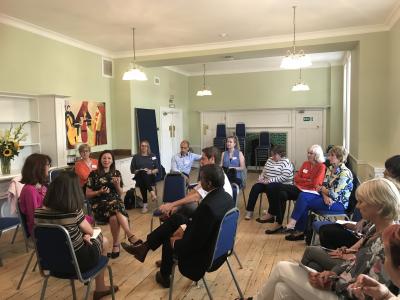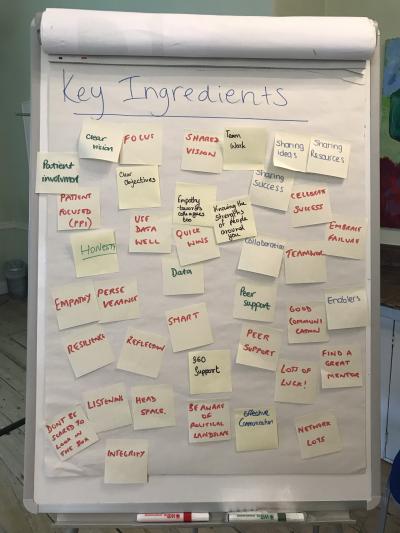
It was wonderful to see some old faces and welcome some new ones to the group at the Diabetes UK Professional Leadership Alumni event. In case you weren’t able to attend, we wanted to share the top ten things we learned and share some of the tools we used on the day.
Charles Leadbeater from the Royal Society of Arts recently shared some observations, concluding that the most successful organisations are ‘creative communities with a cause’.
- Cause, meaning a collective purpose, which in your case is wanting to improve care for people with diabetes.
- Creative, to be innovative, test new ideas and learn from others.
- Finally, Communities, giving a group of passionate people a safe space to come together. But ‘creative communities with a cause’ need a leader to bring this collect commitment together and guide the change needed.
This is very much what the alumni day and the network as a whole was focused on. If we want to see change in diabetes care we need to utilise our creative community with a cause, use this time to network, share ideas, learn new things and then take this back into your own organisations when we leave, because if you want to make changes happen in your own organisations you need to create a creative community with a cause there.
We kicked the day off with a Goldfish bowl, hearing from influential leaders in health about their leadership journey, leadership styles, successes and barriers to leading change. Our ‘fish’ for the day included:
- Bernie Stribling, Director of DESMOND
- Dinesh Nagi, Diabetes and Endocrinology Consultant and Chair of the Association of British Clinical Diabetologists
- Philip Newland Jones, Consultant Pharmacist for Diabetes and Endocrinology
- Roz Davies, Director of Social Inclusion, Good Things Foundation
The top ten lessons from the goldfish
'We can always do better and we can always do better than our resources.’ - Bernie
- Phil spoke about his journey of becoming the first Consultant Pharmacist for Diabetes in the UK and emphasised the importance of challenging the status quo. Just because something hasn’t been done before, doesn’t mean it shouldn’t be tried.
- All our fish spoke about the importance of mentors, recognising that this can often be difficult within the NHS. They very much encouraged finding a mentor outside of the NHS. It is also important to remember that the relationship with a mentor is very much driven by the mentee.
- Clarity in vision is important: know what you want to do, but equally know what you don’t want to do and when you have to say no, ‘know your red line’ Roz.
- Dinesh shared his three steps to success:
- Why are you doing this? Know what you are getting into.
- What is it that you want to achieve? Keep it simple.
- What is your exit strategy? Succession planning is key.
- ‘Be a catalyst for other people’s success’, Phil. Channel your competitiveness to be the best but also use it to support others to be the best. This way, their successes will be equally rewarding and fulfilling for you.
- Collaborate and work with people who compliment your skill set as well as people who are opposite. Conflict is good.
- ‘Failure is just as significant as success’. Sometimes sticking with a project is the real failure, and knowing when to walk away and being able to do so is the true success.
- Making time to reflect and finding ways to take care of yourself is crucial – ‘life happens in parallel to work’
- Sometimes the biggest critiques are the best allies, they can find the flaws that help you develop your project to be stronger than you think. Take them out of their regular work environment and into a different space, like a coffee shop which is neutral territory.
- Some final advice:
- Roz – important to look at the smallest thing that can make the biggest change, quick wins, particularly at the beginning help build momentum.
- Phil – treat others as you would like to be treated. They can come back later with a lot of influence you and support you.
- Bernie – the patient journey is a powerful tool for making the case for change.
- Dinesh – have a can do attitude and invest in the people and teams around you.

Summing it all up
Our ChangeLab session in the afternoon gave everyone a space to reflect on their projects, where things hadn’t worked as well, but also identify the key ingredients for success.
It was a chance to network with colleagues and learn from each other’s experiences. We finished the day by planning for the future using a planning tool called the Yellow Brick Road. You can download the tool and use it for yourself or as a team.
Download Yellow Brick Road (PDF, 55KB)
We received wonderful feedback at the end of the day. Everyone found the opportunity to network, continue to build on their leadership development and learn more about building a long term vision for change was hugely valuable. Our favourite bit of feedback from the day would have to be:
